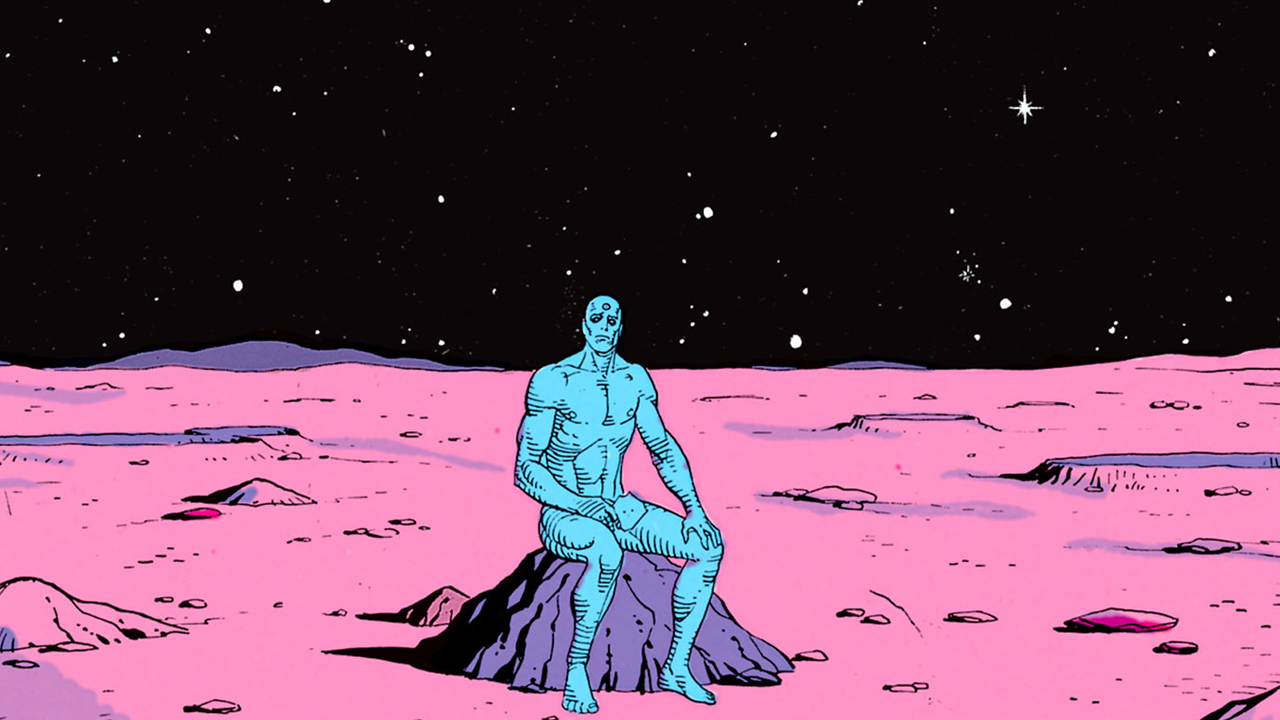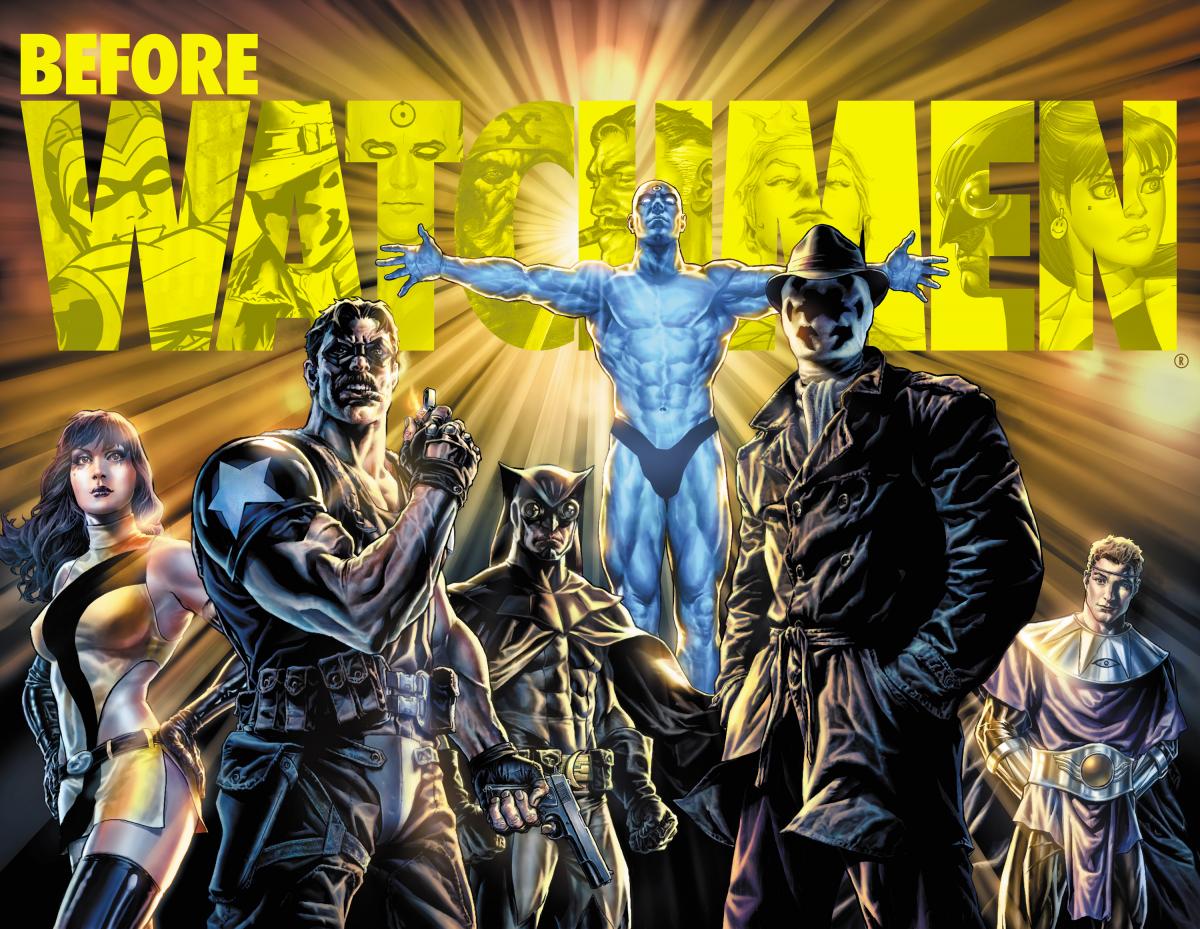Optimism vs. cynicism: Watchmen's DC legacy
DC's 'Rebirth' and Doomsday Clock put a new spotlight on Watchmen - but how did Watchmen change the course of DC the first time?

"Nothing ever ends, Adrian. Nothing ever ends."

Touted as "the most celebrated graphic novel of all time," Alan Moore and Dave Gibbons' Watchmen is getting thrust back in the spotlight this week, with the nigh-omnipotent Dr. Manhattan serving as the shadowy villain behind DC Universe: Rebirth #1. While Geoff Johns's returned Wally West explains that Dr. Manhattan stole 10 years of relationships and history from the DC Universe — while warning of an upcoming "war between hope and despair" between these two worlds — Watchmen wasn't always seen as the boogeyman of DC. Indeed, for decades Watchmen was seen as one of DC's most striking achievements — and also the center of some of its most dogged controversies.
Following his breakout work updating a grim and gritty relaunch of Marvelman (or Miracleman, as it was known in North America at the time) in 1982, Alan Moore was looking for a new set of heroes to update. While initially developing an idea featuring the then-defunct Archie Comics superheroes, he soon revised his pitch for another publisher, following DC's purchase of Charlton Comics' properties in 1985. After hearing Moore's pitch featuring the Charlton characters, DC editor Dick Giordano asked Moore to revise his pitch with his own characters. While at first apprehensive of the lack of inherent recognizability with his original characters, Moore and artist Dave Gibbons realized the story's central theme transcended the typical rules of superhero comics.
"It was the sort of idea that could be applied to any pre-existing group of super-heroes. If it had been the Tower characters — the T. H. U. N. D. E. R. Agents — I could've done the same thing," Moore said in a 2009 interview with Comic Book Artist. "The story was about super-heroes, and it didn't matter which super-heroes it was about, as long as the characters had some kind of emotional resonance, that people would recognize them, so it would have the shock and surprise value when you saw what the reality of these characters was."

And Watchmen, of course, became a breakout success. Praised for its dense symbolism, ultra-deliberate structure and extremely edgy content, Watchmen, along with Frank Miller's The Dark Knight Returns, which had come out earlier that year, went on to inform the entire comics industry.
"Suddenly, everything was grim and gritty," Watchmen editor Len Wein told Entertainment Weekly in 2009. Murder, violence, even rape was now on the table, with characters like Rorschach getting a surprising fandom.
"An awful lot of comics readers felt [Rorschach's] remorseless, frightening, psychotic toughness was his most appealing characteristic," Moore told EW. "Not quite what I was going for."
Get the best comic news, insights, opinions, analysis and more!
For decades to follow, DC and the rest of the comics industry printed books that clearly had Watchmen in their DNA — books like Brad Meltzer's Identity Crisis, J. Michael Straczynski's Supreme Power, Warren Ellis's The Authority, and Mark Millar's Ultimates all owe major debts to Moore and Gibbons' magnum opus, deconstructing and even indicting superheroes as an institution at their best, or adopting only a surface-level veneer of brutality and desolation at their worst. DC has recently gone back to this well of cynical, dark works, as well, ranging from the Before Watchmen prequels to Frank Miller continuing to expand his style of bombastic, ultraviolent work in Dark Knight III: The Master Race, while Grant Morrison has made several nods to Watchmen with his works in Multiversity and Final Crisis. For better or for worse, Watchmen's legacy on DC as a whole cannot be ignored — even Geoff Johns writes in DC Universe: Rebirth #1, "A darkness from somewhere has infected us. It has for a long time now, I think."
Of course, casting Alan Moore as a villain, witting or otherwise, to DC's current state is a bit reductive when one considers the full story. While Watchmen was a critical and commercial success — the book has famously not gone out of print since its debut in 1986, with a million copies of the trade collection being sold in 2008 — the series also became the center of a prolonged and bitter dispute about creator-owned rights. At a convention in 1986, Moore said that, "My understanding is that when Watchmen is finished and DC have not used the characters for a year, they're ours."
But as Moore and DC learned of the hit they had on their hands — with plans for a trade collection to remain in print for what would turn out to be decades — the relationship between them quickly became toxic, as Moore realized the rights for the Watchmen characters would never revert back to the creators. "I said, 'Fair enough… You have managed to successfully swindle me, and so I will never work for you again,'" Moore said to the New York Times in 2006, before the premiere of the film adaptation of V for Vendetta. Paul Levitz, who at the time was publisher of DC, disagreed: "I don't think Alan was dissatisfied at the time… I think he was dissatisfied several years later."
With Moore's resentment towards DC growing, he stated that he had refused any money generated from the film adaptation of Watchmen, and further use of the property with the Before Watchmen prequels only added to Moore's frustration. While the creators involved defended the expansion of the Watchmen universe, Moore was adamantly opposed to it. "I don't want money," he told the New York Times when the prequel comics were announced. "What I want is for this not to happen."

As DC has now famously repudiated Watchmen's legacy on the DC Universe, the property's future remains up in the air, with the publisher struggling to decide if its identity will be informed by optimism or cynicism. Given the revelations that have come with the return of the classic Wally West, it seems as though a battle royale between the Justice League and the Watchmen is inevitable — although given the timetable of the entire Rebirth lineup, it's unclear when or where such a showdown might take place. (Assuming, of course, that Johns hasn't misled readers with his final tease, as Dr. Manhattan doesn't actually appear fully on-panel.) But metatextually, now that Watchmen has ignited and informed an entire generation of DC Comics, it's now being — rightly or wrongly — pointed out as the originator of some of the worst excesses in modern comics history. It remains to be seen, however, if this twist will finally right DC's fortunes, or be the latest fuel to the fire with a decades-long dispute with a legendary creator.
David is a former crime reporter turned comic book expert, and has transformed into a Ringo Award-winning writer of Savage Avengers, Spencer & Locke, Going to the Chapel, Grand Theft Astro, The O.Z., and Scout’s Honor. He also writes for Newsarama, and has worked for CBS, Netflix and Universal Studios too.


